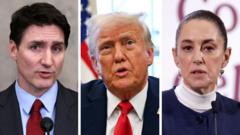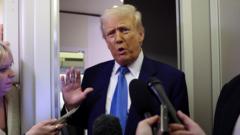A 30-day halt on tariffs aimed at Canada and Mexico offers political victories for both nations while allowing President Trump to claim leverage in his "America First" strategy, but concerns linger regarding future trade relations.
Trade Tensions Abate: US, Canada, and Mexico Reach Temporary Truce

Trade Tensions Abate: US, Canada, and Mexico Reach Temporary Truce
President Trump suspends tariffs on Canada and Mexico, while both nations secure political wins through new agreements on border security and fentanyl trafficking.
In a surprising turn of events, President Donald Trump has decided to suspend the implementation of hefty tariffs on Mexico and Canada for a 30-day period after last-minute negotiations. This temporary truce comes with reciprocal concessions from both neighboring countries, aimed at addressing critical issues like border security and fentanyl trafficking. While Trump might herald this as a victory for his "America First" agenda, both Canadian Prime Minister Justin Trudeau and Mexican President Claudia Sheinbaum also appear to emerge politically strengthened.
Trump's trade strategy involves using the U.S. economy as leverage to compel neighboring countries to acquiesce to his demands. By insisting on stricter measures addressing border crime and the smuggling of drugs, particularly fentanyl, Trump aligns his domestic concerns with international negotiations. Importantly, he has skirted immediate economic fallout for American consumers, averting a potential continental trade war for the time being.
However, skepticism looms over whether this pause will lead to an end of tension once the deadline passes. The uncertainty could drive businesses to reconsider their investments or dependence on American markets, contributing to overall economic anxiety.
For Canada, the announcement of the tariff suspension has been received with relief. Trudeau, facing political challenges as a lame-duck leader, has been navigating the pressures of U.S. trade policy. His government has previously made significant moves, such as a C$1.3 billion investment in border enforcement, to demonstrate its commitment to addressing U.S. concerns. The newly agreed-upon measures—including the appointment of a "fentanyl tsar"—signal an attempt to solidify a cooperative stance going forward.
In Mexico, President Sheinbaum has played a strategic role, advocating for calm throughout the trade brinkmanship. Her successful negotiations with Trump not only stave off immediate tariffs but also ensure that the U.S. will take steps to limit the flow of weapons from the U.S. to Mexico—an essential demand for Sheinbaum's administration. She has gained valuable time to structure further negotiations and potentially reinforce her government’s standing.
With Secretary of State Marco Rubio expected to engage with Mexican officials soon, the path for ongoing bilateral discussions appears more promising than it has in recent months. Sheinbaum aims to convert the temporary suspension into a lasting arrangement, solidifying her government’s early achievements in office.
In conclusion, while President Trump may savor immediate gains in leveraging tariffs for policy changes, Canada and Mexico have proven adept at navigating the turbulent waters of international trade policy. The outcome of this brief reprieve and the potential for amicable resolutions will shape the future of North American relations in uncertain economic times.





















